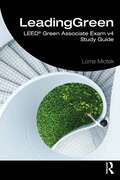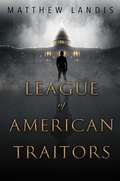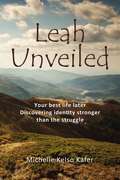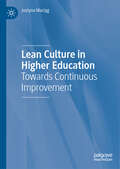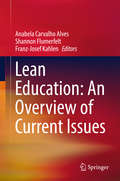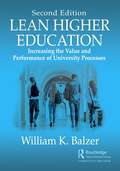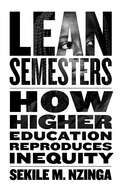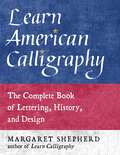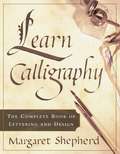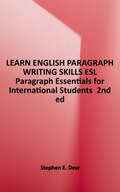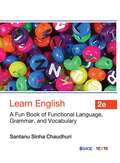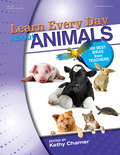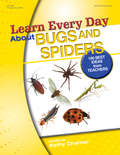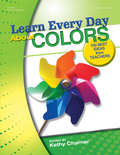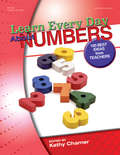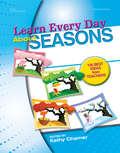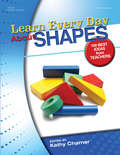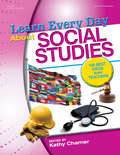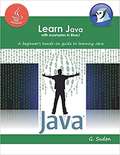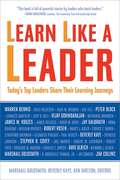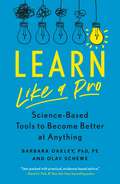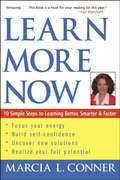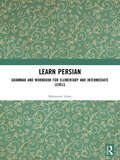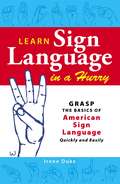- Table View
- List View
LeadingGreen: LEED® Green Associate Exam v4 Study Guide
by Lorne MlotekLeadingGreen: LEED® Green Associate Exam v4 Study Guide brings together a concise introduction to the core concepts behind the LEED green building rating system with efficient, effective test preparation for the LEED® Green Associate Exam. The guide provides an essential foundation in principles of sustainable design and construction for students and professionals in the areas of architecture, engineering, construction, real estate development, urban planning, and environmental policy. If you are interested in passing the LEED® Green Associate Exam, this is the right place to start. The background, objectives, and evolution of green building standards – as well as what actually goes into a LEED building – are covered in a clear and straightforward manner. Tailored to precise exam expectations, the guide breaks down the key LEED categories one credit at a time. Drawing upon the author’s extensive experience as a LEED educator for universities and professional firms around the world, the guide includes proven tips and tricks that have helped over 10,000 people pass the Green Associate Exam. An ideal resource for self-study, LeadingGreen: LEED® Green Associate Exam v4 Study Guide will benefit readers from all built environment professions in which LEED credentials are an asset.
League of American Traitors
by Matthew LandisThose who don’t know history are destined to repeat it . . . When seventeen year-old Jasper is approached at the funeral of his deadbeat father by a man claiming to be an associate of his deceased parents, he’s thrust into a world of secrets tied to America’s history—and he’s right at the heart of it. First, Jasper finds out he is the sole surviving descendant of Benedict Arnold, the most notorious traitor in American history. Then he learns that his father’s death was no accident. Jasper is at the center of a war that has been going on for centuries, in which the descendants of the heroes and traitors of the American Revolution still duel to the death for the sake of their honor.His only hope to escape his dangerous fate on his eighteenth birthday? Take up the research his father was pursuing at the time of his death, to clear Arnold’s name. Whisked off to a boarding school populated by other descendants of notorious American traitors, it’s a race to discover the truth. But if Jasper doesn’t find a way to uncover the evidence his father was hunting for, he may end up paying for the sins of his forefathers with his own life.Like a mash-up of National Treasure and Hamilton, Matthew Landis’s debut spins the what-ifs of American history into a heart-pounding thriller steeped in conspiracy, clue hunting, and danger.
Leah Unveiled: Your Best Life Later, Discovering Identity Stronger than the Struggle
by Michelle Kelso KaferIn the book of Genesis, we see creation, God&’s pursuit in covenant, displays of righteousness and faith, but also humanity&’s rebellion, judgment, racism, social inequality, and depravity run amuck. We see the difference in walking by faith with God and walking by worldly standards. We see holy justice and raw human injustice. In Genesis chapters 29 and 30, there is no shortage of these elements, where God chose to preserve a diary, of sorts, of a matriarch of the faith. Though history has reduced her story to only descriptive paragraphs, this twelve-week Bible study will unveil why God chose to carry her testimony for our benefit in living out the Christian life. God took her humble position and grafted her into the scarlet thread of the Gospel story. You know her as the wife to a patriarch, who was in love with her sister, and a mother to eight of the original twelve tribes of Israel. Her name is Leah. After this expository styled study, you will be astonished and captivated by her testimony of how faith wrestles to thrive in the land of the living while yielding to the hope of heaven. She is a channel by which world history has been shaped and our hope secured in Christ. You will be encouraged and convicted as you wrestle with the God who revealed Himself to her and who stands to do the same for you.
Lean Culture in Higher Education: Towards Continuous Improvement
by Justyna MaciągThis book deepens the understanding of cultural conditions for implementing organizational and process changes in higher education institutions. Developing the humanistic and critical trend in Lean management research, it aims to define the notion and maturity of a Lean culture in higher education institutions as well as to determine its key dimensions and descriptions in the light of adopted ontological and epistemological assumptions. This book defines the notion of Lean Culture, proposes a model to assess its maturity, determines conditions for its implementation, and presents the tools of the Lean management model in a university. It supplements the issues related to the implementation of the Lean concept by adopting a humanistic approach.
Lean Education: An Overview of Current Issues
by Franz-Josef Kahlen Shannon Flumerfelt Anabela Carvalho AlvesThis edited volume presents a structured approach to a new lean education curriculum, implemented for the education of engineers, managers, administrators as well as human resources developers. The authorship comprises professors and lecturers, trainers and practitioners who educate future professionals in Lean Thinking principles and tools. This edited book provides a platform for authors to share their efforts in building a Body of Knowledge (BoK) for Lean Education. The topical spectrum is state-of-the-art in this field, but the book also includes a glimpse into future developments. This is a highly informative and carefully presented book, providing valuable insight for scholars with an interest in Lean Education.
Lean Higher Education: Increasing the Value and Performance of University Processes, Second Edition
by William K. BalzerIn an environment of diminishing resources, growing enrollment, and increasing expectations of accountability, Lean Higher Education: Increasing the Value and Performance of University Processes, Second Edition provides the understanding and the tools required to return education to the consumers it was designed to serve – the students. It supplies a unifying framework for implementing and sustaining a Lean Higher Education (LHE) transformation at any institution, regardless of size or mission. Using straightforward language, relevant examples, and step-by-step guidelines for introducing Lean interventions, this authoritative resource explains how to involve stakeholders in the delivery of quality every step of the way. The author details a flexible series of steps to help ensure stakeholders understand all critical work processes. He presents a wealth of empirical evidence that highlights successful applications of Lean concepts at major universities and provides proven methods for uncovering and eliminating activities that overburden staff yet contribute little or no added value to stakeholders. Complete with standardized methods for correctly diagnosing workplace problems and implementing appropriate solutions, this valuable reference arms you with the understanding and the tools to effectively balance the needs of all stakeholders. By implementing the Lean practices covered in these pages, your school will be better positioned to provide higher quality education, at reduced costs, with efficient processes that instill pride, maximize value, and respect the long-term interests of your students, faculty, and staff. This second edition contains a substantial update with expanded material and reflects the significant growth of LHE practices in colleges and universities worldwide. Because of advances in best practices, as well as some modest research-based evidence, this second edition includes many enhancements that provide particular value to LHE practitioners and higher education (HE) leaders. Since the initial publication of Lean Higher Education in 2010, the challenges of cost and affordability, competition for students and faculty, and calls for efficiency and accountability have only continued to grow, requiring colleges and universities to pursue more radical and transformative change to ensure their success. This new edition provides a model for change based on more than 50 years of application in business and industry and almost 20 years in HE. It provides the information and evidence demanded by HE leadership to understand and embrace LHE as well as best practices processes and tools for implementing LHE in targeted areas or institution-wide. This book provides a conceptual framework for redesigning any university process, such as admitting students, paying a bill, hiring faculty, or processing a donor gift, in a way that delights the beneficiary of that process, respects the employees who support the process, and reduce the cost of the process.
Lean Semesters: How Higher Education Reproduces Inequity (Critical University Studies)
by Sekile M. NzingaMore Black women are graduating with advanced degrees than ever before. Despite the fact that their educational and professional opportunities should be expanding, highly educated Black women face strained and worsening economic, material, and labor conditions in graduate school and along their academic career trajectory. Black women are less likely to be funded as graduate students, are disproportionately hired as contingent faculty, are trained and hired within undervalued disciplines, and incur the highest levels of educational debt. In Lean Semesters, Sekile M. Nzinga argues that the corporatized university—long celebrated as a purveyor of progress and opportunity—actually systematically indebts and disposes of Black women's bodies, their intellectual contributions, and their potential en masse. Insisting that "shifts" in higher education must recognize such unjust dynamics as intrinsic, not tangential, to the operation of the neoliberal university, Nzinga draws on candid interviews with thirty-one Black women at various stages of their academic careers. Their richly varied experiences reveal why underrepresented women of color are so vulnerable to the compounded forms of exploitation and inequity within the late capitalist terrain of this once-revered social institution.Amplifying the voices of promising and prophetic Black academic women by mapping the impact of the current of higher education on their lives, the book's collective testimonies demand that we place value on these scholars' intellectual labor, untapped potential, and humanity. It also illuminates the ways past liberal feminist "victories" within academia have yet to become accessible to all women. Informed by the work of scholars and labor activists who have interrogated the various forms of inequity produced and reproduced by institutions of higher education under neoliberalism, Lean Semesters serves as a timely and accessible call to action.
Learn American Calligraphy: The Complete Book of Lettering, History, and Design
by Margaret ShepherdTake a visual trip around the United States, with stop-offs in many locations and insights on every page, and illuminate the past and future of American calligraphy. For centuries, American calligraphers have accepted the legacy of the classic Roman, Gothic, and Italic calligraphy they inherited from Europe without realizing that there are more alphabet treasures to be found in a larger pool of uniquely American alphabet designs. Wild West, New Deal, Prairie—all were made in America, and they express ideas that reveal national character. These styles come from here and nowhere else. Much like American music, language, fashion, and philosophy, calligraphy has matured, moved on from its origins, and become, in the words of the man who created Spencerian handwriting, &“even more American.&” Learn American Calligraphy is the latest book from Margaret Shepherd, author of one of the all-time bestselling books on calligraphy, Learn Calligraphy. This new book focuses on American calligraphy, which has its own identity, distinct from the alphabets inherited from Europe. As a lifelong calligrapher, Shepherd surveys the landscape of unique styles and describes how two dozen alphabets originated and what shaped them. Simple diagrams and exercises help you try out the styles for yourself. Some letters represent a region or a major era of art; some bear witness to social upheaval or culture change; many are accessible to beginners; and a few contradict the established view of American history.
Learn Calligraphy: The Complete Book of Lettering and Design
by Margaret ShepherdIn an age of myriad computer fonts and instant communication, your handwriting style is increasingly a very personal creation. In this book, Margaret Shepherd, America's premier calligrapher, shows you that calligraphy is not simply a craft you can learn, but an elegant art form that you can make your own.Calligraphy remains perennially popular, often adorning wedding invitations, diplomas, and commercial signs. Whether it is Roman, Gothic, Celtic, Bookhand, or Italic style, calligraphy conveys class and elegance. Margaret Shepherd makes this ancient art form accessible in a completely hand-lettered technical guide that will:* Provide context for calligraphy as an art, exploring the rich tradition of hand-lettering and mapping the evolution of the most popular styles.* Give detailed technical advice on choosing pens, paper, and inks, setting up your workspace, mastering various pen angles, along with step-by-step illustrations to guide you as you practice. * Explain which alphabets are appropriate for different forms of writing. For example, the Roman alphabet works well for short, unpunctuated passages, while the Italic alphabet is more suited to informal everyday communication. * Encourage you to personalize your lettering by using variant strokes and interpreting how you would like the words to look on the page.* Inspire you with carefully chosen illustrations and examples, which bring letters to life.In Margaret Shepherd's own words, "Calligraphy trains not only your eye and hand, but your mind as well." Learn Calligraphy is the authoritative primer for this age-old craft, and will help develop a new appreciation for lettering as you discover your creative personality.
Learn English Paragraph Writing Skills: ESL Paragraph Essentials for International Students (Academic Writing Skills Ser.)
by Stephen E. DewThis book is an academic writing skills guide for International ESL students. The book is the first in a series of academic writing handbooks for international undergraduates, graduates, high school students, and mature-age students of English as a second language. It was designed as a supplementary guide to support IELTS and ESL students' regular English classes. <p><p>What's in it for You? It specifically addresses academic paragraph writing skills and development. In particular, it covers: <p>• What academic writing is <p>• Paragraph format and structure <p>• Paragraph organization <p><p>In addition, it covers more comprehensively the areas of capitalization, punctuation, and sentence structure. The last part, The Academic English Writing Process, details the essential steps to create a mature and confident academic paragraph writer. As the book was designed as a supplementary paragraph writing guide, it does not contain any exercises. It only contains rules, examples, and simple explanations written by an experienced TESOL instructor. This unique academic writing skills guide will teach you good academic writing skills for university entrance. Ideal for the International ESL Student. Get better results with the Academic Writing Skills series.
Learn English: A Fun Book of Functional Language, Grammar, and Vocabulary
by Santanu Sinha ChaudhuriA one-book army that will demolish your fear of and troubles with English! If you wish to improve your English but don't know where to begin, try reading this book. Learn English is a complete package that presents the fundamentals of the English language in an enjoyable, reader-friendly style. From basic sentences to complex grammatical forms, from essential English words to modern business vocabulary, and from common errors to elements of style, this book covers them all! As you work through the book, you will find answers to your questions in easy-to-understand, informal language. The book is specifically aimed at South Asians who face similar challenges while learning English. With contexts and stories they can easily relate to, this book offers insights into English in a fun way. It will help you speak and write English with clarity and confidence. This book: • Can an be used either by self-learners or in a classroom • Is based on modern concepts of second language acquisition • Deals with linguistic challenges and cultural aspects from a South Asian perspective
Learn Every Day About Animals: 100 Best Ideas from Teachers
by Kathy CharnerLearning about ANIMALS has never been so much fun!Even the youngest children love animals; they want to pet puppies, visit lions at the zoo, and imitate animal sounds. Learn Every Day About Animals is an activity book inspired by children's fascination with our furry friends. With this resource, teachers can easily incorporate learning about animals into any curriculum: Games like "Whose Feet Are These?" teach recognition, while "Playdough Porcupine" allows children to explore different art mediums, and "Scratch Like a Monkey" gets children active and moving. Curiosity about our animal friends is natural for children ages 3 to 6, and with Learn Every Day About Animals, the learning has never been more fun! Each activity features: * Learning objectives * Vocabulary * Related children's books * Materials * Preparation (if necessary) * What to do * An assessment component Each of the books in the Learn Every Day series offers teachers 100 classroom-tested activities that make learning fun and engaging for young children!
Learn Every Day About Bugs and Spiders: 100 Best Ideas from Teachers
by Kathy CharnerLearning about BUGS AND SPIDERS has never been so much fun! Bugs and spiders are fascinating to adults and children alike! Now teachers can take children on an expedition into the mysterious world of some of nature's smallest inhabitants, with Learn Every Day About Bugs and Spiders.These easy-to-do activities give children a peek into the lives of our creepy-crawler friends, with activities like "Create Caterpillars" and games like "Ants in Your Pants!" Children will love exploring the world of these mysterious and interesting creatures, and teachers will find the activities in Learn Every Day About Bugs and Spiders to be adaptable, expansive, and most of all, fun!Each activity features: * Learning objectives * Vocabulary * Related children's books * Materials * Preparation (if necessary) * What to do * An assessment component Each of the books in the Learn Every Day series offers teachers 100 classroom-tested activities that make learning fun and engaging for young children!
Learn Every Day About Colors: 100 Best Ideas from Teachers
by Kathy CharnerLearning about COLORS has never been so much fun!The result of a nationwide contest, teachers from around the globe have contributed their favorite classroom activities, all focused on topics that teachers use every day! Organized by curriculum area, the activities in each chapter begin with those that are appropriate for the youngest preschooler and end with activities that six-year-olds will enjoy. Learn Every Day About Colors has 100 activities for children ages 3-6, providing teachers with innovative and fun ways to introduce and reinforce learning about colors. With activities such as My Favorite Color Collage; Rain Painting; The Blue, Blue Sky; and I Can Sing a Rainbow, children will delight in learning all about colors! Each activity features:*Learning objectives *Related vocabulary *Related children's books *Materials needed *Directions for preparation *Instructions for each activity *An assessment component Many activities also feature teacher-to-teacher tips that provide additional ideas for expanding the activity in new ways, or suggestions about finding materials. You will also find related fingerplays, poems, or songs to expand children's learning.This book, along with the other books in the Learn Every Day series, gives teachers 100 activities that make learning fun and engaging for young children!
Learn Every Day About Numbers: 100 Best Ideas from Teachers
by Kathy CharnerLearning about NUMBERS has never been so much fun!Classroom-tested and teacher-approved, these activities help children ages 3-6 learn all about numbers. With 100 engaging and fun activities,Learn Every Day About Numbers offers everything a teacher needs to build a foundation for future math learning. Children will love becoming a Number Detective, a Flashlight Writer, or a Number Hero as they investigate the wonderful world of numbers. Each activity offers learning objectives to meet standards, a materials list, related children's books, and an assessment component to measure children's learning. Learn Every Day About Numbers is sure to become a classroom favorite! Each activity features: *Learning objectives *Related vocabulary *Related children's books *Materials needed *Directions for preparation *Instructions for each activity *An assessment componentMany activities also feature teacher-to-teacher tips that provide additional ideas for expanding the activity in new ways, or suggestions about finding materials. You will also find related fingerplays, poems, or songs to extend children's learning.This book, like each of the other books in the Learn Every Day series, gives teachers 100 classroom-tested activities that make learning fun and engaging for young children!
Learn Every Day About Our Green Earth: 100 Best Ideas from Teachers
by Kathy CharnerLearning about OUR GREEN EARTH has never been so much fun! Taking care of our planet has never been more important, and this book will teach even the youngest children about environmental responsibility. Learn Every Day About Our Green Earth makes it easy for teachers to incorporate discussions about caring for the Earth into any curriculum with activities that promote responsible behaviors and are fun and enjoyable. In this book, activities like "Recycling Adds Up" and "Block Compost" teach children the importance of reusing and recycling, while "Thank a Tree" and "Worms Are Good Guys" teach them to respect and love nature. Global awareness is everyone's responsibility, and the activities in Learn Every Day About Our Green Earth help teachers pass along this important knowledge to the next generation.Each activity features: * Learning objectives * Vocabulary * Related children's books * Materials * Preparation (if necessary) * What to do * An assessment component Each of the books in the Learn Every Day series offers teachers 100 classroom-tested activities that make learning fun and engaging for young children!
Learn Every Day About Seasons: 100 Best Ideas from Teachers
by Kathy CharnerNow teachers can bring the magic of each season into their classrooms with these activities that introduce children to the wonder of the seasons with a year full of fun! Classroom-tested teacher favorites, this book features activities that teach children to understand the difference between the seasons, as well as activities that can only be done during certain seasons. Children will love making paper cutout fall leaves, suns, and snowflakes as they celebrate the joy and excitement of the world outside all year long!
Learn Every Day About Shapes: 100 Best Ideas from Teachers
by Kathy CharnerLearning about shapes has never been so much fun!This new book features 100 activities all about shapes! Teachers and children alike will enjoy exploring the concept of shapes with activities such as Have You Seen My Square, The Circle in the Square, and Erase a Shape. The result of a nationwide contest, these activities are organized by curriculum area and offer fresh ideas that provide hours of engaging activities. Complete with learning objectives, related children's books, and an assessment component, teachers will find everything they need to teach children ages 3-6 all about shapes. Learn Every Day About Shapes is sure to become a classroom favorite!Each activity features: *Learning objectives *Related vocabulary *Related children's books *Materials needed *Directions for preparation *Instructions for each activity *An assessment component Many activities also feature teacher-to-teacher tips that provide additional ideas for expanding the activity in new ways, or suggestions about finding materials. You will also find related fingerplays, poems, or songs to extend children's learning.This book, like each of the other books in the Learn Every Day series, give teachers 100 classroom-tested activities that make learning fun and engaging for young children!
Learn Every Day About Social Studies: 100 Best Ideas from Teachers
by Kathy CharnerChildren are innately interested in their world. The activities in Learn Every Day About Social Studies invite children to explore the world around them, learn about different cultures, enjoy a variety of careers, and discover the uniqueness of their very own neighborhood. From the many ways we are alike and different to the variety of homes around the world, children will delve into these social studies activities that are perfect for children ages 3 to 6.
Learn Java With Examples In BlueJ: A Beginner's Hands-on Approach to Learning Java
by G. SudenLearn Java with examples in BlueJ, gets you started programming in Java right away. Learning a complex new language is not an easy task especially when it’s an object-oriented programming language like Java. This practical beginner’s guide enables you to: <P><P> Gain a solid understanding of Java. Understand difference between Procedure Oriented Programming (POP) and Object Oriented Programming (OOP). Teach you fundamental concepts of Object Oriented Programming, Objects and Classes. Each program shown with its associated output. Explanation of difficult lines of code. All programs compiled and executed in the BlueJ Development Environment. Extensive examples provided in each chapter. Empower you to develop logical and analytical thinking using object-oriented approach in Java. A hands-on and exercise-rich book in Java programming for beginners. Start brewing up great programs with Java! Knowledge of other programming languages is not required. Book designed to teach Java in readable style with small and direct programs making even arcane concepts clear.
Learn Like a Leader: Today's Top Leaders Share Their Learning Journeys
by Marshall Goldsmith Beverly Kaye Ken SheltonWhy are some people able to grow in their careers while others never fully reach their potential? Learn Like a Leader explores this question by examining defining moments of leadership. The authors share personal stories gathered from great leaders such as James Collins, Warren Bennis, and Dave Ulrich, portraying the power of storytelling in training and mentoring.
Learn Like a Pro: Science-Based Tools to Become Better at Anything
by Barbara Oakley PhD Olav ScheweA book for learners of all ages containing the best and most updated advice on learning from neuroscience and cognitive psychology. Do you spend too much time learning with disappointing results? Do you find it difficult to remember what you read? Do you put off studying because it’s boring and you’re easily distracted? This book is for you.Dr. Barbara Oakley and Olav Schewe have both struggled in the past with their learning. But they have found techniques to help them master any material. Building on insights from neuroscience and cognitive psychology, they give you a crash course to improve your ability to learn, no matter what the subject is. Through their decades of writing, teaching, and research on learning, the authors have developed deep connections with experts from a vast array of disciplines. And it’s all honed with feedback from thousands of students who have themselves gone through the trenches of learning. Successful learners gradually add tools and techniques to their mental toolbox, and they think critically about their learning to determine when and how to best use their mental tools. That allows these learners to make the best use of their brains, whether those brains seem “naturally” geared toward learning or not. This book will teach you how you can do the same.
Learn More Now: 10 Simple Steps to Learning Better, Smarter, and Faster
by Marcia L. ConnerThis book is part road map, part blueprint, and part magical decoder ring, all rolled into one. The primary purpose of this book is to help you create a meaningful and fulfilling life by embracing the nature of continual learning. Its also about more than just learning. Learn More Now will help you become more aware, more focused, aligned with your natural pace, and improvisational in whatever you do. It will encourage you to learn your own life's lessons, and grow into your potential.
Learn Persian: Grammar and Workbook for Elementary and Intermediate Levels
by Mahmood AlamLearn Persian has a step-by-step organized and structured framework of modern Persian words; grammar, short syntactical phrases and idiomatic expressions. Persian has a lot of common words and sounds from Arabic and Urdu; this work highlights vowels and consonants that are covered in the formation of words and sounds with apt precision. The special feature of this book is its simplicity, yet meaningful and comprehensiveness for the study of the language. This should be a good source book for new learners, as well as for those who want to explore the harmony and flair of Persian. It would undoubtedly open doors to a Persian heritage as much as it slowly trains the eager learner in spoken Persian as well. Learn Persian will interest both learners and experts, and an excellent experience of coming across Persian as an interesting living language.
Learn Sign Language in a Hurry: Grasp the Basics of American Sign Language Quickly and Easily
by Irene Duke"I love you.""What can I get you?""Let's take a walk."Wanting to say simple things like these but not being able to is frustrating and disheartening-but learning how to communicate can be easy and fun! This book is a basic guide to the alphabet, vocabulary, and techniques it takes to connect using American Sign Language. Whether signing out of necessity or learning for the sake of growing, you will enjoy this practical primer. After reading this book, you will be able to use American Sign Language in a social, educational, or professional setting.Whether the goal is to communicate with hearing-impaired grandparent, a child with special needs in school, or an infant, people learn sign language for many different reasons. Easy to read and reference-and complete with images and examples of common signs-this basic guide allows you to make a meaningful connection that's otherwise impossible.
